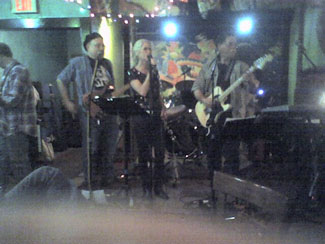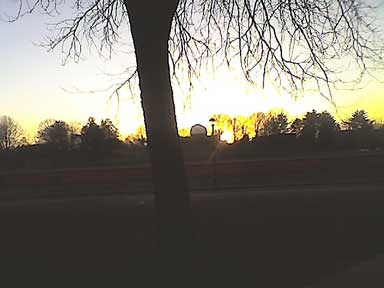Our students have come back to Middletown, and those who have been here all along (internationals, thesis writers, athletes, and yes, graduate students) are realizing that now there is just one long sprint until the end of the semester. There is almost a frenzy of activity from now until Commencement. This week the letters from admission go out announcing who will be admitted to the Class of 2012. Meanwhile, seniors are busy finishing their projects and, in many cases, looking for jobs that begin post-graduation. Midterms and research papers are being prepared, and faculty are busy grading. The easy rhythms of spring break are already distant.
From my office window I see the athletic grounds crew preparing the baseball field for upcoming contests. Men’s baseball and women’s softball are returning from trips to sunnier climes, and this week we have games but we also expect a little snow. Men’s and women’s lacrosse have already been busy after their spring break trips, and the tennis teams are also in full gear. Our student athletes add a great dimension to our campus, and there will be many great opportunities to cheer on the Red and Black.
In addition to their normal duties, several faculty members are working in small committees to refine ideas for curricular innovation that I wrote about in a previous entry. I am so impressed by the professors’ willingness to consider how we integrate the academic and the co-curricular, and to think creatively about what interdisciplinary study will mean in the future. From creativity to civic engagement, our teachers find ways to integrate their own scholarly and artistic work into a vibrant undergraduate curriculum.
Over the break there was a controversy on campus concerning whether Wesleyan should post on its Web site an op-ed piece published in the Hartford Courant by Melanye Price, an assistant professor in our Government Department. We publish links to many popular press articles by Wesleyan people, but we are specifically forbidden (because of our not-for-profit tax status) from participating in election activity in support of a candidate. Would posting a link to Professor Price’s op-ed piece, which is very sympathetic to Barack Obama, violate this IRS rule? Or would we just be providing a link rather than an endorsement? Surely, we also could post a link to another article by Wesleyan faculty backing John McCain or Hillary Clinton.
Our legal adviser thought we shouldn’t post a link, but some faculty wondered if we were avoiding politics in ways that distort who we really are as an institution. The IRS rules have to do with candidates during an election year – not just taking sides on issues. We didn’t post the link on the home page, but I am not confident that we shouldn’t have done so. Here’s the link to Professor Price’s interesting article You can decide for yourself.
[the link is now down, so here is the article from the Hartford Courant, March 16, 2008, downloaded the text from Lexis-Nexis.]
WHAT OBAMA MEANS;
DARING TO HOPE: CANDIDATE POSES STARK TURN FOR PERCEPTION OF RACE IN AMERICA
BYLINE: MELANYE T. PRICE
Media pundits and supporters claim Barack Obama is at his best when viewed in person, so I went to the recent Obama rally at the XL Center in Hartford to see for myself. Ultimately, I came away convinced that Obama actually could succeed. I found myself both embracing and eschewing the conflicting meanings of an Obama presidency.
The most audaciously hopeful aspect of an Obama rally has to be the attendees, who represent every demographic imaginable. Waiting with me were professors, white suburban mothers, Obama gear-clad teenagers, an older African American couple, and a group of young black and Latino men.
As we waited with thousands, we became unlikely allies, holding places for bathroom breaks, scouting the best entrance and seats and discussing Obama’s appeal. Were we a “grand coalition for change” as Obama suggested? Moreover, could he translate our differing versions of change into coherent policies?
Seeing the diversity of people gathered had a strong effect, which was augmented by the fervor of his youngest supporters. When the rally began, I cheered for them as much as for Obama. Their enthusiasm made his success more urgent, if only to sustain this youthful energy and burgeoning community. In one sense, Obama was right: America’s promise is the potential for citizens to unite across differences.
Despite this, I was plagued by the precariousness of having Obama become the definition or model of black behavior for African Americans and ultimately all Americans. His is an engaging and captivating message, but not the only one that other blacks would deliver.
At the rally, a young black girl wore a button with Obama dressed as Superman that read “Super Obama.” This image resonated with me because like the comic book hero, Obama comes with his own Kryptonite. First, like other contenders, Obama cannot be all things to all people when concrete policies supplant grand concepts. More disturbing, however, is my fear of what Obama’s candidacy – win or lose – means for race in America.
We saw in Iowa how self-congratulatory many whites were of their ability to overcome America’s racist history to endorse an African American. Obama’s initial success signaled to many that the racism of the past had greatly dissipated. Should he actually secure the nomination or the presidency, would it provide conclusive evidence that the nation has finally entered a color-blind future?
This is the danger of a deracialized (or “transcendent”) campaign strategy. While racial inequality remains a central feature of American life, black candidates who directly attack that inequality are sure to repel many white voters and candidates like Obama will be more successful.
Likewise, protest-oriented (read “angry”) black grass-roots advocates may find it difficult to gain political traction in post-Obama America. If Obama is the new prototype for black political activity – less focused on race, less angry, more hopeful, “clean, articulate” and so on – what will this mean for focused efforts to combat racial inequality?
Furthermore, listening to Obama, I wondered if the greatest danger for me and other blacks is that if he loses it will confirm enduring fears that despite public rhetoric, when the votes count, whites will not endorse or accept blacks as leaders. If the most hopeful and non-angry (and maybe the most educated and prepared) African American candidate cannot crash the privileged gates of political power, who will? Put simply, I am not sure that blacks can take this kind of rejection.
That little girl with the Super Obama button cannot, and I fear for others. Blacks are told “no” in myriad ways in life, and it would be especially painful to have Super Obama rejected as well. This is an implicit concern, I believe, of many blacks, which explains increased black support for Obama after Iowa. Many blacks withheld judgment and support as they waited to see whether Obama could truly attract white support in sufficient numbers.
In the same way, the Clintons knew repetitive emphasis on his blackness could hurt his potential with many white voters.
Leaving the XL Center, I was afloat on the crowd’s enthusiasm, the community it embodied, and partially Obama’s words. I also remembered the power of hope. Not hope for an Obama presidency. Not even Obama’s brand of race-neutral, bipartisan hope.
Instead, I remembered the hopes of voting rights advocates, the freedom riders, and my own single mother at the bus stop too many cold mornings. I remembered that blacks have lost over and over again, but they got up and kept moving. I thought about how we might have described other ragtag coalitions like those in line with me. Only these coalitions were facing bigger odds – slavery’s abolition or Jim Crow’s defeat – and marshaled varied and unusual allies.
I could not be complicit in the loss of hope or reinforce the jaded expectations. I could not let past losses rob them or me of this victory. I knew when I entered that arena that I would be voting for Obama, but when I left I knew with greater clarity why.
Melanye T. Price is an assistant professor of government at Wesleyan University.
Copyright 2008 The Hartford Courant Company
All Rights Reserved
[tags]curriculum, innovation, Obama, IRS, campaign rules[/tags]





 What a great event! Wesleyan alum Lin-Manuel Miranda’s musical, In the Heights, is a triumph on Broadway!! This is a play that
What a great event! Wesleyan alum Lin-Manuel Miranda’s musical, In the Heights, is a triumph on Broadway!! This is a play that